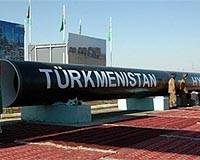 |
Sonda De Campeche, Mexico (AFP) Aug 16, 2010 Firefighters leapt forward with a gushing hose on a Gulf of Mexico oil rig as fake victims were stretchered off in a practice run following BP's Deepwater Horizon disaster. The Mexican drill came amid fears of a repeat catastrophe, and as producers like Mexico chase reserves into deeper and more dangerous waters. One of the world's top oil producers, Mexico currently churns out some 2.6 million barrels of oil a day. A third comes from the Ku Maloob Zaap field where the Ku-S rig lies. But with output plunging in its shallow-water oil fields, Mexico could begin importing oil -- which finances a large chunk of the state budget -- within the decade. State-run Pemex oil company presents the mega-structure of the Ku-S rig as a model of stringent security measures as it takes on the challenge of digging deeper for oil. But the rig, weighing more than 14,000 metric tons, only extracts the black gold at some 60 meters, far from the 500 meters (1,640 feet) considered deep waters. Touring the massive structure, rig director Francisco Contreras said he feared no BP-scale disaster on his watch. Some 4.1 million barrels of oil spewed into the Gulf before BP could this month contain its ruptured well, 1,500 meters below the surface, after an April explosion that killed 11 workers. "Thanks to the security systems we have in the oil and gas lines, in the case of any change, we'd detect it and our automatic shut-off system would kick in," Contreras said. There have been no accidents in more than 1,000 days, Contreras said, demonstrating three alarm systems. Oil was discovered in the Ku-Maloob Zaap field eight years ago, shortly before production started declining at the giant Cantarell field. Efforts to develop the Chicontepec field, onland near the Gulf coast, have struggled to take off, adding to the urgency for Pemex to drill deeper. "We're going to double our deepwater drilling capacity for next year," said Carlos Morales Gil, Pemex's director of exploration and operations. Mexico's congress passed an overhaul of Mexico's oil law in 2008, putting new controls on Pemex as it seeks to exploit what it claims are a possible 50 billion barrels buried deep in the Gulf of Mexico. But the Deepwater Horizon blowout proved that systems do fail. "If there's something that we can learn from the BP spill, I think it is basically that there are no technologies that are completely safe and there are no technologies that are useful when there is an explosion and a spillage," said independent energy analyst David Shields. Aside from its lack of experience in deep-water exploration, Mexican law still prevents Pemex from freely working with foreign partners, despite the oil reform. So it has to take on more risks, as well as the enormous costs, of using new technology and security procedures, Shields said. Pemex should suspend its deepwater plans in the Gulf until it comes up to speed with the safety, he added. Environmentalists would like countries to go even further, and switch to greener energy sources in light of the BP spill. "As long as we keep on relying on this type of technology, well, in all likelihood we're going to keep on having oil spills," said Alejandro Olivera, from Greenpeace Mexico. But the state-run Mexican company, which has been a symbol of national pride for decades, is determined to press ahead. In November, Pemex will set up one of three semi-submersible exploration platforms in the south of the Gulf of Mexico in a well reaching 940 meters (3,000 feet) down. Once workers are familiar with the rig, it will move to the Maximino well in April 2011. The well, which is not far the US maritime border, is the deepest ever to be drilled by Pemex at 2,600 meters (8,530 feet).
Share This Article With Planet Earth
Related Links Powering The World in the 21st Century at Energy-Daily.com
 Turkmenistan opens up to U.S. oil majors
Turkmenistan opens up to U.S. oil majorsAshgabat, Turkmenistan (UPI) Aug 16, 2010 Turkmenistan for the first time opened up its energy sector to the United States when it invited three U.S. oil companies to the bidding for offshore oil concessions. Aside from Mudabala of the United Arab Emirates, Turkmenistan chose Chevron, ConocoPhillips and TXOil from Houston as the preferred bidders for two offshore oil concessions in the Caspian Sea, Russian news agency ITAR-Tass ... read more |
|
| The content herein, unless otherwise known to be public domain, are Copyright 1995-2010 - SpaceDaily. AFP and UPI Wire Stories are copyright Agence France-Presse and United Press International. ESA Portal Reports are copyright European Space Agency. All NASA sourced material is public domain. Additional copyrights may apply in whole or part to other bona fide parties. Advertising does not imply endorsement,agreement or approval of any opinions, statements or information provided by SpaceDaily on any Web page published or hosted by SpaceDaily. Privacy Statement |